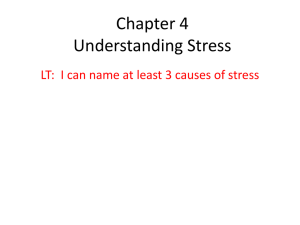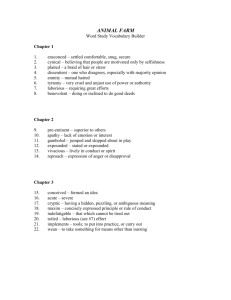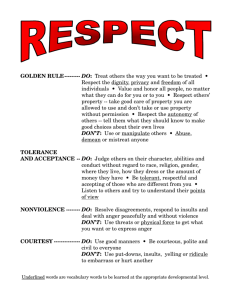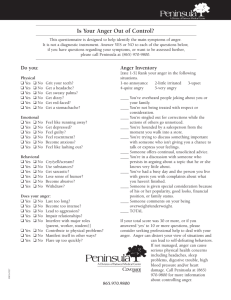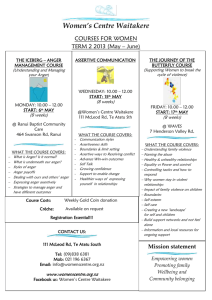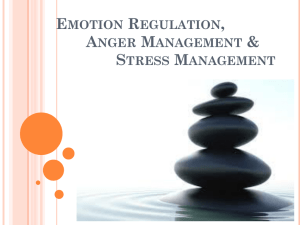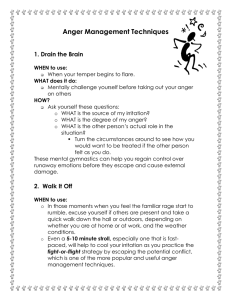Mental and Emotional Health
advertisement
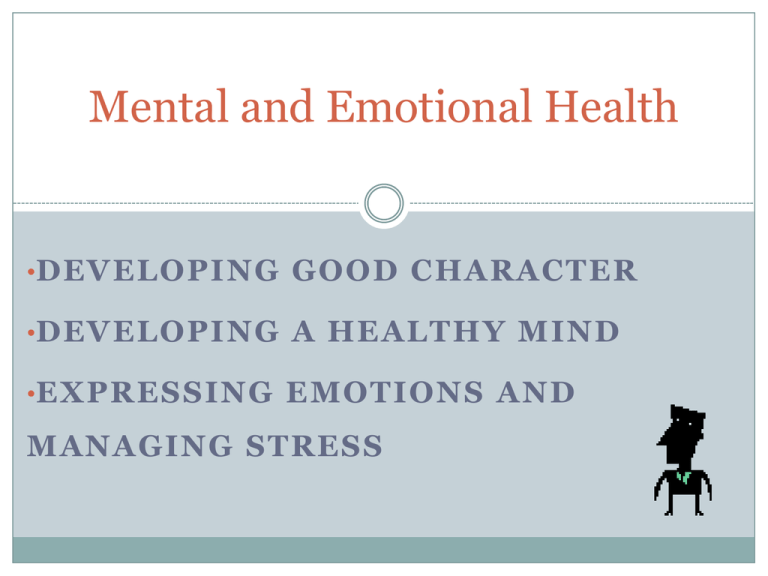
Mental and Emotional Health •DEVELOPING GOOD CHARACTER •DEVELOPING A HEALTHY MIND •EXPRESSING EMOTIONS AND MANAGING STRESS Assignment Group 1 Group 2 Group 3 Codependence Relapse Addiction Hostility Mental Disorder Personality Mind Body Connection Formal Intervention Emotion Codependent Serotonin Attitude Hidden Anger Projection Stress Group 4 Group 5 Group 6 General Adaptation Syndrome & Three Stages Anger Management Skills Stress Management Skills VOCABULARY Codependence – a problem in which people neglect themselves to care for, or try to “fix” someone else. Relapse – a return to previous behavior, such as drug misuse or abuse. Addiction – a condition in which a person denies that they are depressed or have a problem and rely on material things for comfort such as binge eating or shopping. Hostility – a chronic state of anger. Mental Disorder – behavioral or psychological syndrome or pattern that occurs in an individual and that is associated with distress or disability. VOCABULARY Personality – an individual’s unique pattern of characteristics that makes him or her different from others. Formal Intervention – an action by people such as friends or family members, who want an addicted person to get treatment Codependent – person who neglects himself/herself and instead wants to care for, rescue, or control someone else. Attitude – feeling of emotion toward something or someone Projection – blaming others for actions or events for which they are not responsible. VOCABULARY Mind Body Connection – relationship between your thoughts and feelings and bodily responses. Emotion – a specific feeling, such as anger, happiness or anxiety. Serotonin – chemical involved in controlling states of consciousness and mood. Hidden Anger – unrecognized, inappropriately expressed anger. Stress – response of the body to daily living demands. General Adaptation Syndrome (GAS) Series of body changes resulting from stress. Broken up into three stages: The Alarm Stage The Resistance Stage The Exhaustion Stage Alarm Stage Sometimes called the “Fight or Flight Stage” Adrenaline is secreted into the blood stream. The following body changes occur during this stage: Pupils dilate to improve vision Hearing sharpens Saliva decreases (dry mouth) Heart rate and blood pressure increase Increased blood flow to muscles Muscles tighten Resistance Stage The body attempts to regain internal balance Adrenaline is no longer secreted Body changes include: Pupils constrict Hearing is normal Saliva increases Heart rate and blood pressure return to normal Muscles relax Exhaustion Stage People find themselves in this stage after a long period spent in the alarm stage Wear and tear on body increase the risk of injury, illness and premature death. Due to people’s lack of ability to manage the stressors in their life. Anger Management Healthful ways to control and express anger. Keep an anger self-inventory – what? Why? Who? Use I-messages instead of you-messages. Less threatening. Write it down in a letter or journal. Do some safe physical activity Find something to laugh at Talk to someone who is not the trigger of your anger. Stress Management Skills Techniques to prevent and deal with stressors and to protect one’s health from the harmful effects produced by stress response. Make responsible decision Manage time effectively Manage money effectively. Talk to responsible adults Have good friends who will support you. Protecting Your Health During Stressful Periods Be physically active Write things down – keep a journal Use breathing techniques – slow breathing in through nose and out of mouth Eat a healthful diet – stress uses up supply of Vitamin B & C Vitamin B is needed for a healthy nervous system Vitamin C is needed for a healthy immune system Get plenty of rest and sleep. When stressed your body works extra hard so it needs extra rest. Getting Help & Resiliency
